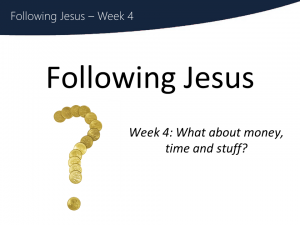
Sooner or later, people who are serious about spiritual growth have to think about how we best use the resources that God has given us….we are going to spend the next two weeks looking at how we are called to use our time, our talents and our financial resources as we try to learn how to follow Jesus.
If someone told you that the Bible was a great way to learn about Jesus, and then handed you a Bible with a bunch of sections blacked out, you’d be suspicious, wouldn’t you? You’d wonder what they were holding back, and rightfully so.
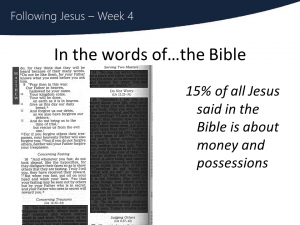
Unfortunately money is a hard thing to talk about in our society. But because Jesus spoke a great deal about money, much more than he ever said about sex, it would be dishonest of me to pretend that Jesus didn’t have an awful lot to say about money and how we live with it. It would be like blacking out 15% of Jesus’ words in the Bible!
I think Jesus said so much about money and possessions because he knew that the place of money in our lives was a spiritual issue far more than it was simply an economic issue.
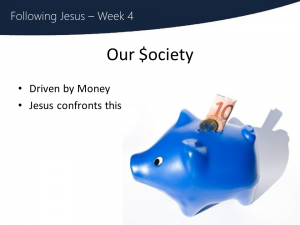
Our culture is driven by money. All of us have been conditioned from our earliest awakenings to be acutely aware of the importance of money. We spend a lot of time and energy thinking about money. We think about how much we need and how much we have, how we will get more, how we will keep what we have and how we will spend it., All of us deal with these issues every day of our lives. Thoughts of money are never far from any of us.
In light of our culture’s obsession with money, Jesus statements about money seem naïve and ridiculous. These are not the principals of modern financial planners. Obviously Jesus thought about money differently from the way that we have been taught to think about it. As followers of Jesus we are called to develop a radically different way of evaluating the place of money in our lives.
Jesus knew the human heart in all its complexity and he knew that one’s attitude towards money would have a profound influence for good or for ill on ones potential for spiritual growth. Here are some of the things that Jesus knew about people and their money.
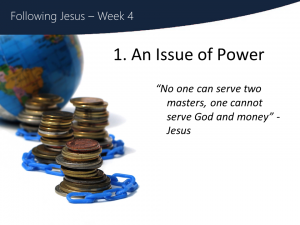
Jesus knew that money has seductive power. It can almost effortlessly lure us into its sphere of influence. Before we know it, we are living lives in its service. It calls us, it drives us, it threatens us, and it rewards us.
This is a deep rooted power. It reaches to the very center of who we are and what we live for.
Jesus ascribed to money almost ultimate power. “No one” he said “can serve two masters, one cannot serve God and money.” You can only serve one master faithfully. Somewhere, something has to give.
When he said this he was talking about money, but he gave it a personality and power. It is so interesting, that Jesus puts something almost on par with God, at least in terms of the way money can masquerade as God in our lives.
The point he was leading to was this: You cannot serve both God and money! If God and the vision of God’s reign is not the ultimate focus of our lives, something else will be. For many of us the something else will be money in its various forms. Money has a power all of its own. It has the power to take the very place of God in our lives. Money can lure us into its service.
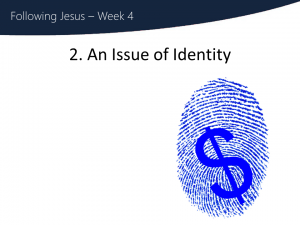
Jesus knew that left to our own devices, most of us will eventually seek our identity in money and the things it provides—especially for men…the breadwinner. Our possessions declare our value. WE even speak of people’s net worth, when we’re really just talking about money, not what they are actually worth as a whole person!
It is important for us to realize that the drive to acquire is only secondarily fueled by greed. It is first and foremost a quest for identity and worth. Our possessions can tell the world that we are making it. We are worth something. We have value. We are important. Look at our house, our car, our boat, and our clothes. We are getting ahead, we are important people.
It has been noted many times before about our society that “We spend money we don’t have on things we don’t need to impress people that we don’t like.”
Shop till you drop is a rather sad picture of a society possessed by possessing. Born to shop is a depressing slogan of a world that has lost its identity and direction. The one who dies with the most toys wins is a haunting cry from the anguished and twisted soul of a society convulsing towards death. Jesus knew where all of this would lead.
A couple once went to dinner, and told me that they sat near this well dressed elderly gentleman, who was having dinner with someone very different, a provocatively dressed woman about half his age. She was showing him how her iPhone worked, and though he seemed overwhelmed, she made it seem like they were having a great time, speaking loudly, giggling and so on. We wondered if this was really a relationship, or if she was paid for companionship.
Well, after leaving the restaurant, we passed the same man in the street, and he was a changed man. He was alone, and looked sad. His time was up, because his money was out.
Our money is so limited, even if it pretends to have unlimited power. It allows us to carry on like everything is great, like we really can buy happiness. But the moment it runs out, it’s painfully obvious that it hasn’t really changed who we are.
Because the rush to consume, spend and horde is so far removed from the truth of who we are, of who we were created to be, it can only lead to heartache.
Question: What are some of the ingrained assumptions that you have about money?
